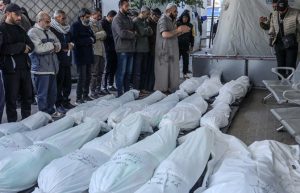Catastrophic Flooding Engulfs Southeast Bangladesh, Strains Relief Efforts
4 min read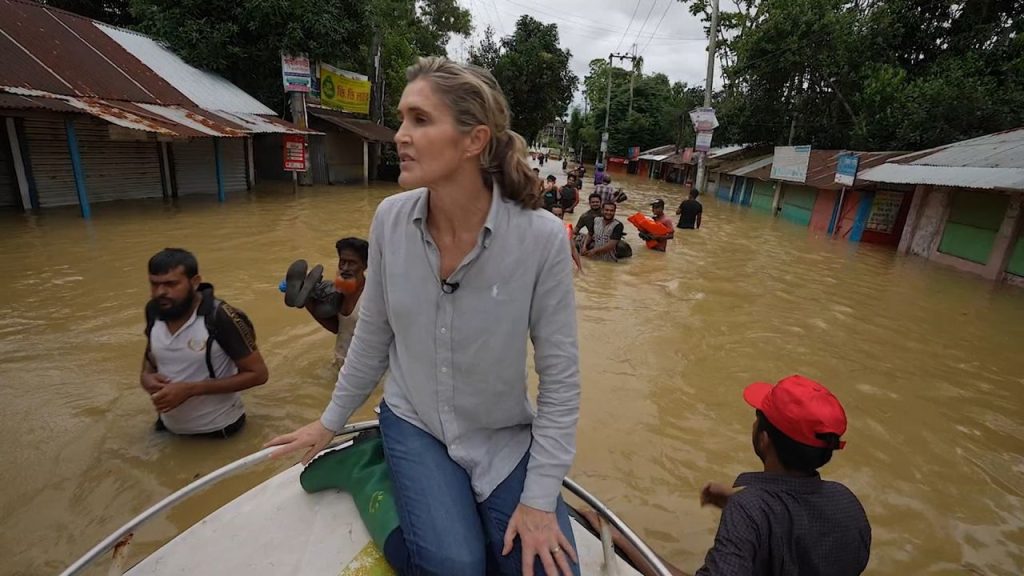
In the heart of Feni, a city in southeast Bangladesh, the scene is nothing short of devastating. Residents wade through murky floodwaters reaching chest height, clutching their belongings above their heads in a desperate attempt to keep them dry. The flood has transformed the city of nearly 1.5 million people into an inundated landscape, leaving many stranded and struggling to reach safety.
Since the night of August 21, the waters have surged across 11 districts, submerging vast areas and overwhelming local infrastructure. Bangladesh, a nation heavily reliant on its rivers for both agriculture and daily life, is no stranger to flooding and cyclones. However, the scale of this disaster has taken the country by surprise, leading to widespread blame directed at neighboring India.
Feni’s proximity to the Indian border has amplified the tension. Many locals accuse the Indian government of releasing water from the Dumbur Dam in Tripura state without prior warning. it was known that residents expressed their anger and frustration, with some shouting slogans like “We hate India” and “This is Indian water.”
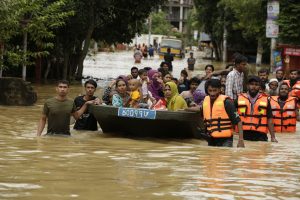
Shoriful Islam, a 29-year-old IT worker from Dhaka who returned to Feni to assist with rescue operations, voiced his frustration, stating, “They opened the gate, but no information was given.” India has denied accusations of deliberate action, attributing the flooding to excessive rainfall. However, they acknowledged that a power outage and communication failures prevented the usual warnings from being issued.
Amid these tensions, volunteer Abdus Salam, who teaches English in Dhaka, is grappling with personal loss. Twelve members of his family, including his sisters, brother, and their children, are stranded in a rural area 25 kilometers from Feni’s center. “I don’t know if they are alive,” Salam confided, his voice breaking. The lack of electricity, gas, and internet has compounded his anguish, highlighting the dire need for international assistance.
The flooding has impacted nearly 5 million people across Bangladesh, with at least 18 confirmed dead, though the true toll may be significantly higher. In Tripura, India, the situation is also dire, with at least 26 fatalities and over 64,000 people seeking refuge in relief camps.
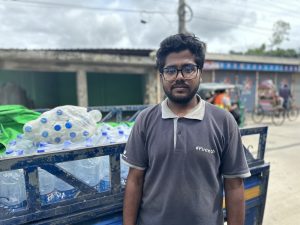
The gravity of this flood has stirred anger and suspicion about its origins. Indian High Commissioner to Bangladesh, Pranay Verma, explained that the dam’s “automatic release” was due to high water levels, not a deliberate act. Nevertheless, some in Bangladesh suspect political motivations behind the dam release. Recently, Bangladesh experienced significant political upheaval, with former Prime Minister Sheikh Hasina ousted following a student-led protest movement. Hasina, who had fostered strong ties with Indian Prime Minister Narendra Modi, fled to India amid the unrest.
The interim Bangladeshi government, led by Nobel laureate Muhammad Yunus, has been critical of India’s response. Nahid Islam, a student representative, accused India of “displaying inhumanity” by failing to issue a warning. India’s Ministry of External Affairs countered these claims, stressing that the flooding was primarily due to water from the Gumti River and calling for collaborative efforts to address the issue.
As diplomatic tensions simmer, rescue operations in Feni are fraught with challenges. The usual four-hour drive from Dhaka has become an arduous eight-hour journey due to congested roads. Rescue teams and volunteers face shortages of boats and other resources. Many families, like Yasin Arafat, are left helpless. Arafat, who traveled from Dhaka to find his family stranded on a rooftop, is struggling to secure a boat to reach them. “They have no water, no food, and they’re very scared,” he said, reflecting the broader desperation felt by many in the flood zone.
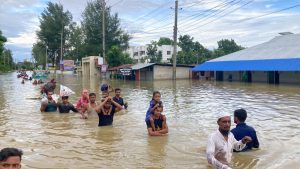
Navigating the flooded city has become a logistical nightmare. Streets have turned into waterways, and the only access to many areas is by boat. The main highway, now submerged, has become a critical route for those seeking higher ground. Volunteers and rescue workers must manually carry boats through flooded areas, further complicating efforts.
Inside the city, government buildings and schools have been repurposed as temporary shelters. One such shelter, a government building, houses around 500 people. Multi-story buildings, including a hospital and several schools, have become makeshift homes for those whose single-story residences are now underwater. Despite being physically safe, these makeshift shelters lack basic necessities like food, water, and medicine.
Peyara Akther, a 36-year-old resident, is desperately trying to rescue her sister and her sick newborn from a rural area. The infant has been without food for days, and Akther fears for the baby’s survival. Her search is hindered by the communications blackout, adding to the mounting difficulties faced by rescue teams.
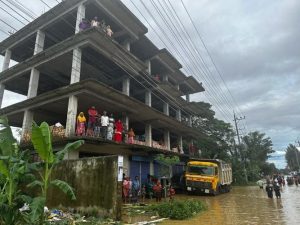
Elsewhere, a Feni native who works as a security guard in Qatar has returned to aid his family. Though he managed to secure a boat, his efforts to reach his 55-year-old mother have been in vain due to her remote location. Instead, he focuses on rescuing other relatives, bringing relief to a family of four who are exhausted but grateful to be safe.
As night falls, rescue operations continue under challenging conditions. The primary hope for the people of Feni is that aid will arrive in time or that the floodwaters will recede soon. For now, the focus remains on ensuring the survival of those stranded and delivering essential relief to those in need.



